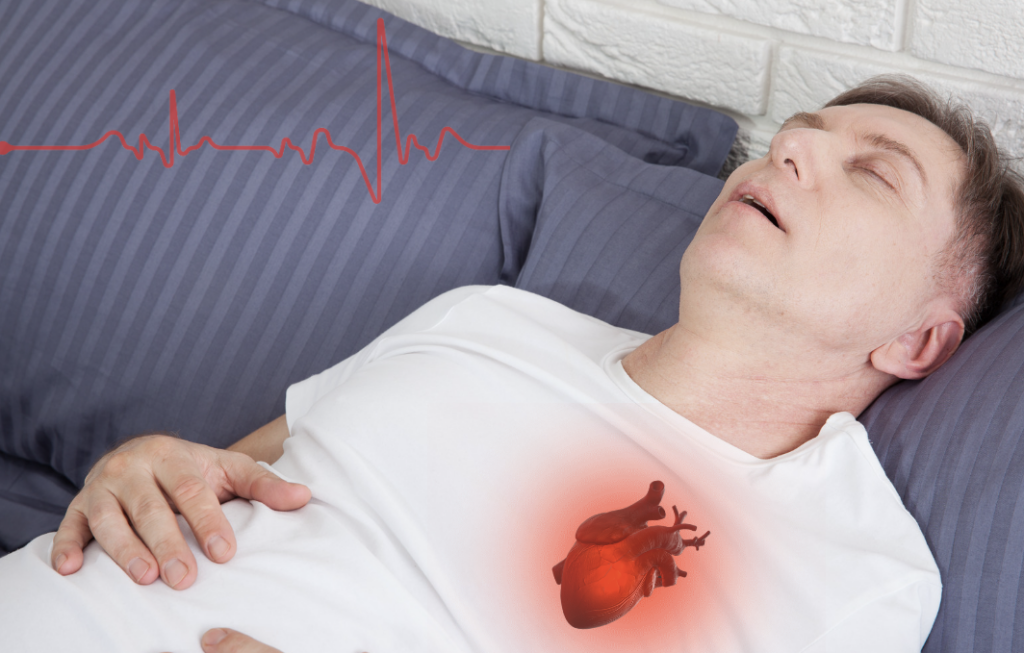Health Conditions
How Sleep Apnea and Heart Failure are Linked
Sleep apnea is a sleep disorder that significantly impacts the lives of millions of people all over the world and is frequently associated with heart failure. The objective of this article is to study a particular type of sleep apnea that is frequently related with heart failure and to gain a better understanding of the underlying connections that exist between the two conditions.
Types of Sleep Apnea
Sleep apnea is divided into three types: obstructive sleep apnea (OSA), central sleep apnea (CSA), and mixed sleep apnea (MSA). While all three forms can have a negative impact on one’s health, OSA is the most common and frequently related with heart failure.

Obstructive Sleep Apnea
Obstructive sleep apnea occurs when the upper airway becomes partially or totally blocked during sleep, causing breathing pauses. This occlusion can be caused by extra weight, big tonsils, or a narrowed airway. As a result, people with OSA may snore loudly, gasp for air when sleeping, and feel sleepy during the day.
The relationship between OSA and heart failure is the periodic breathing disruptions that occur throughout the night. These breathing pauses can induce a reduction in blood oxygen levels, increasing stress on the heart. Over time, the strain on the heart might lead to the development or progression of heart failure.
Central Sleep Apnea
The inability of the brain to provide the appropriate signals to the muscles that control breathing is the root cause of central sleep apnea, in contrast to obstructive sleep apnea (OSA). There is a relatively low incidence of this particular form of sleep apnea, which is typically associated with other medical conditions such as congestive heart failure, stroke, or brainstem injury. It is difficult to determine the exact nature of the connection between central sleep apnea and heart failure because the two conditions frequently overlap and exacerbate one another.

Mixed Sleep Apnea
Obstructive sleep apnea and central sleep apnea are both components of mixed sleep apnea. People who suffer from multiple sclerosis have periods of both airway blockage and interrupted brain signals, which causes them to experience breathing pauses while they are sleeping. Despite the fact that the precise connection between obstructive sleep apnea and heart failure is not understood, it is believed that the combined effects of both types of sleep apnea can result in increased pressure on the cardiovascular system.
Symptoms of Sleep Apnea and Heart Failure
Because of the possibility that the symptoms of sleep apnea and heart failure are similar, it is essential to make an accurate diagnosis of the underlying cause. It is common for those who have sleep apnea to experience symptoms such as loud snoring, gasping for air while sleeping, headaches in the morning, everyday fatigue, and difficulty concentrating. There are a number of symptoms that may be associated with heart failure, including shortness of breath, fatigue, swelling in the ankles or legs, and difficulties lying down.
Keep in mind that not everyone who has a sleep condition also develops heart failure, and vice versa. This is not something that should be forgotten. Individuals who suffer from both disorders, on the other hand, have a greater propensity to face serious health difficulties, which calls for the early detection and treatment of these conditions.

Diagnosis and Treatment Options
If you feel you have sleep apnea or heart failure, you should get medical attention for a proper diagnosis. A sleep study, which monitors your breathing patterns, oxygen levels, and other vital indicators overnight, is commonly used to diagnose sleep apnea. Echocardiograms, electrocardiograms, and blood tests may be performed on patients with heart failure to monitor heart function and uncover underlying reasons.
Treatment options for sleep apnea and heart failure differ depending on the severity of the illnesses and the patient’s specific needs. Continuous positive airway pressure (CPAP) therapy is a popular treatment for sleep apnea that involves wearing a mask while sleeping to provide a steady flow of air to keep the airway open. Other therapeutic possibilities include losing weight, avoiding alcohol and sedatives, and sleeping in a specific position.
Heart failure treatment may include drugs to control symptoms and enhance heart function, lifestyle modifications like a heart-healthy diet and regular exercise, and, in certain situations, surgical procedures or surgery. It is critical to collaborate closely with healthcare specialists to create a specific treatment strategy that addresses both sleep apnea and cardiac failure.
Lifestyle Changes to Manage Sleep Apnea and Heart Failure
Alterations to one’s way of life, in addition to using medical treatments, can be helpful in the management of sleep apnea and heart failure. Controlling stress, maintaining a healthy weight, giving up smoking and drinking excessive amounts of alcohol, practicing good sleep hygiene, and maintaining a healthy weight are all examples of these modifications. Those who make these adjustments to their way of life have the potential to improve their overall health and reduce the likelihood of experiencing complications associated with sleep apnea and cardiovascular failure.
Conclusion
Sleep apnea, particularly obstructive sleep apnea, is commonly associated with heart failure. The relationship between the two conditions is complex, with each exacerbating the other’s effects. Identifying the specific type of sleep apnea that is commonly linked to cardiovascular failure is crucial in order to develop effective management and treatment strategies.
Remember, early detection and appropriate management are key to minimizing the impact of sleep apnea and heart failure on your health. Don’t hesitate to reach out to healthcare professionals who can guide you on the path to a better sleep and a healthier heart.
Trusted Health, Wellness, and Medical advice for your well-being


